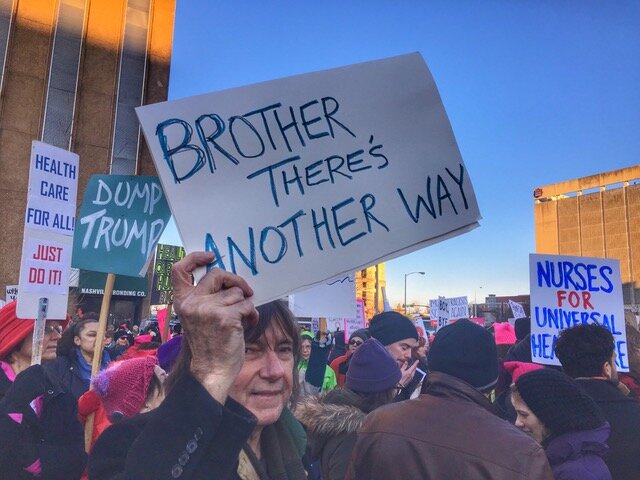
Social Justice and Psychotherapy
“Why, as a psychotherapist, do I care about social justice, especially income inequality in Tennessee?”
Because one’s mental health is not simply a matter of biology and upbringing– it is also a consequence of the health (or illness) of the community and culture in which we live.
If that culture is made sick (by poverty, racism, and sexism both rationalized and ignored; by institutionalized cronyism and corruption; by extreme polarization and the absence of civil debate and discourse; by the glorification of personal gain at the expense of others; by lack of educational and job opportunities that would allow economic advancement), it will transmit sickness to its members. When people are treated as objects– as things to be used, overlooked, and discarded, the entire society suffers, including many of the well-off who become emotionally and physically insulated from suffering while remaining oblivious to the reality that their very self-interests are endangered by crime, social decline, lack of productivity, and unsustainable economic practices.
As a psychotherapist, I cannot pretend that my patient’s difficulties arise only from their inner conflicts. Many of those inner conflicts are born of harsh external realities. Our social structures and institutions, even our cultural ideals, assign fault to anyone who does not steadily climb the socio-economic ladder. Yet, as a society, we fail to allow equal access to the resources and opportunities that make that kind of success possible.
As a healing professional, I am complicit in my patients’ suffering if I ignore the very real obstacles our society imposes on their growth and empowerment. It is crazy-making to expect a patient to accept responsibility for their lives when they are deprived of the means to take control and are often thwarted and undermined when they attempt to take control. It is crazy-making to medicate someone’s anxiety when so much of the culture in which they live engenders fear. It is cruel to blame someone who is subject to the effects of living in a rigged system (one that claims that corporations are people, that million-dollar contributions to political campaigns are expressions of free speech, that economy-wrecking theft by "too-big-to-fail" corporations should go unpunished while incarceration of the poor and the non-white continues unchecked).
Much of psychotherapy has to do with power. One of the primary objectives of any psychotherapy is to empower the patient to live his or her own life fully– with awareness and compassion and creativity. My hours are devoted to helping my patients identify the barriers to their own empowerment and to assist them in making choices that reflect their inner dignity and worth. This often means helping those who are excluded from power in society to understand what they are up against. For society’s insiders, it often means correcting the myopia that fosters the notion that their achievements have come through their efforts and talents alone. Ignorance of our interrelatedness is an illness unto itself.
I care about social justice, because I know we can do better. I know the power of community to offer healing and growth.
In our profession, we recognize that the individual exists as a part of a wider circle. Family therapy itself evolved from the realization that when one person changes, the entire family dynamic is affected, and that sometimes the family will unconsciously work to prevent the change from taking hold. Often the family must heal so that its members can grow. I am proud to be a life-long Tennessean and I do not think that Tennessee must wait for the rest of the country to tell us what is just or what is intelligent or how to address these inequalities and their consequences. We don’t need others to force us to care for our sick, to teach our children, or to respect our differences. We can lead, and I hope we will.


